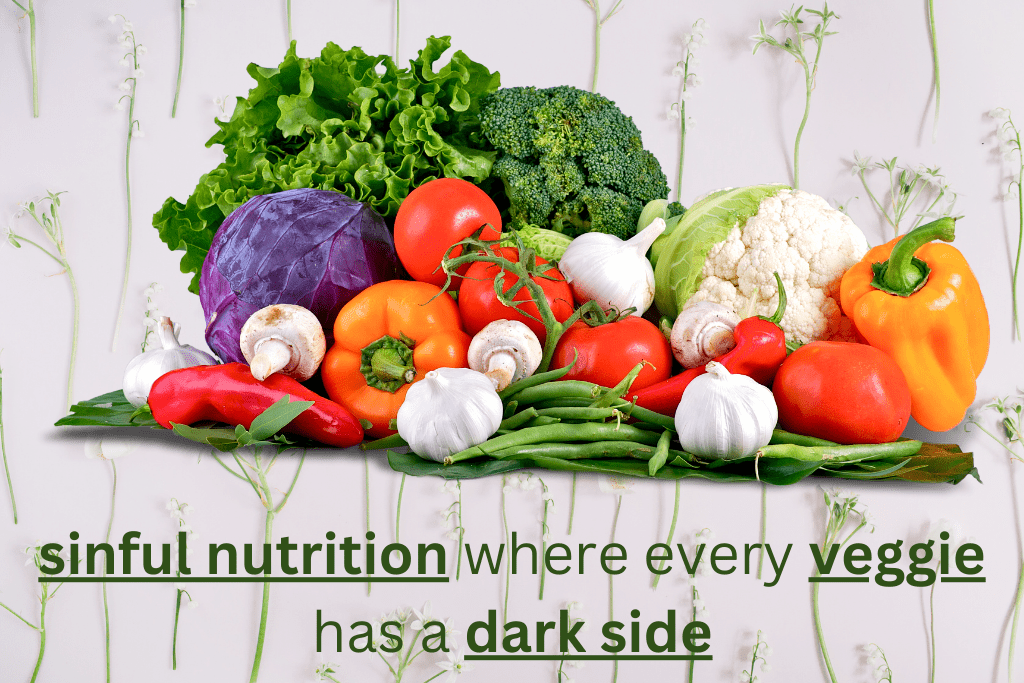What are the dark side of vegetables and what does it means? This article will share insight how sinful nutrition where every veggie has a dark side and which vegetables fall into this group: If you’ve heard of the “benefits of green vegetables” then you’re already familiar with how important it is to eat healthy.
But did you know that there are also “sinful nutrition” “nightshade vegetable” “dark greens” in this list? That’s right, even though spinach and broccoli are both considered superfoods for their nutritional value (and taste), they can still be harmful if consumed in large quantities over time.
Generally speaking, not all vegetables are bad vegetables. There are many vegetables that are good to include in your daily meal, beside and many people eat those vegetables as their favorite food. Like Yin and yang, almost every veggie could have some side effects to a person, so they are avoided as bad to health.
What makes people think about sinful nutrition where every veggie has a dark side?
1. Spinach
Spinach is one of the most nutrient-dense foods in the world, but it’s also one of the most nutritious foods that can cause health problems. Like all cruciferous vegetables (cauliflower, broccoli and Brussels sprouts), spinach contains glucosinolates— chemical compounds that help protect against cancer and heart disease by inhibiting the formation of carcinogenic chemicals in our bodies.

But these protective compounds also make up for some of spinach’s bad side effects: high levels nitrates and oxalates—which can damage our blood vessels and have negative impacts on our heart health when consumed over time.
For example, a study published in 2000 found that people who ate more than 1/4 cup per day had an increased risk for developing kidney stones compared to those who ate less than 1/8 cup per week!
2. Broccoli
Broccoli is a good source of vitamins K and calcium, two important vitamins for maintaining strong, healthy bones. Broccoli is rich in vitamin C, vitamin K and calcium. It also has fiber. Broccoli is a Cruciferous vegetables that contains Glucosinolates which can help prevent breast and heart cancer.

However Broccoli may create digestive distress, especially in individual with gas or irritable bowel syndrome due to high amounts of fiber presence in Broccoli.
3. Asparagus
Asparagus is a great source of vitamins K and A, which help maintain healthy bones and teeth. It’s also high in folate, manganese and fiber. Asparagus is great for you if you want to improve your bone health or prevent osteoporosis (a condition that weakens your bones).

Asparagus contains no saturated fat or cholesterol—it’s low in calories too! You can add this veggie to soups or stews as well as eat it raw with some lemon juice squeezed on top.
There are no known serious side effects of eating asparagus. However when consume in a large quantities, the fiber presence in the vegetable may create diarrhea, gas, or bloating problem to some people.
4. Radishes
Radishes are a great source of vitamin C, folate and potassium. They are also high in fiber, which means that they can help you feel full for longer periods of time. Radishes have just 14 calories per 1 cup serving, making them one of the lowest calorie foods you can eat!
Radishes contain less sodium than many other vegetables (only 16 mg per serving), but they still provide important nutrients such as calcium and iron. These nutrients keep your bones strong so they don’t break when you exercise vigorously or suffer from an injury like a broken leg or wrist fracture.

Radish seeds contain very little saturated fat because they are stored under the skin while growing; however it is possible that some people may find its taste too bitter if eaten raw (just like any other vegetable).
Eating too much of radish can lead excess water loss from your body and may create dehydration. Excessive plenty of radish might reduce your blood pressure and can cause hypoglycemia.
5. Sweet potato fries
Sweet potato fries are not healthy. They’re sweet and delicious, but they also contain a lot of calories and carbohydrates.
Sweet potatoes are high in sugar, fat and sodium — making them bad news for your waistline. In fact, research shows that every serving of sweet potato fries has over 300 milligrams of sodium! That adds up to more than half of your day’s recommended intake for salt!

Sweet potato fries also contain more carbs than any other vegetable or fruit (1 cookout bag contains about 8 grams per serving). The good news is that most Americans don’t need much added sugar because it’s naturally occurring in fruits like apples or bananas.
Eating plenty of sweet potatoes when having problem with stomach can create discomfort and may lead to diarrhea, stomach aches, and bloating issues. Hypervitaminosis A can be caused by the excessive consumption of sweet potatoes, and can cause damage to your health.
6. Beet juice and canned beets
Nitrates and nitrites are the most common forms of nitric oxide in our bodies, which is the main cause of headaches.
Beet juice has been found to contain a high level of nitrates and nitrites. The metabolites that are produced after beet juice is digested by the body can lead to headaches or migraines, as well as stomach aches and nausea.

Canned beets have similar levels of these harmful compounds when compared with fresh ones—and they’re even worse if you eat them raw!
If you have high blood pressure, stay away from these vegetable groups.
If you have high blood pressure, stay away from these vegetable groups.
- Salt and sodium are also unhealthy for your heart.
Sodium is found in salt, but also in baking soda and baking powder; all three of these foods can increase blood pressure by causing an increase in fluid retention (i.e., bloating).
This can lead to heart failure, which is what happens when the heart becomes so overwhelmed with work that it fails to pump enough oxygenated blood around the body at a fast enough rate—and this condition often leads to death if left untreated!
Conclusion
The takeaway from this article about sinful nutrition where every veggie has a dark side is to limit your consumption of any veggie if you suffer from high blood pressure. This may sound obvious, but when it comes to the health benefits of veggies, it’s important not to overlook them thinking just about vegetable dark side!
They’ve been shown time and time again to help lower cholesterol levels, prevent diabetes and heart disease, improve eyesight (and even help slow down age-related macular degeneration) – just think about all these things before giving up on your favorite foods forever.
Personally, I am fan of green veggies, grains and includes in my diet plan to stay healthy and fit. I would not recommended avoiding all green vegetables, you can always consult with your doctor or health nutrition to learn which green veggie you should eat and avoid.
Enjoyed reading how sinful nutrition where every veggie has a dark side? Subscribe to our website for more health and fitness posts.
FAQs
What are some examples of sinful vegetables?
Sinful vegetables are those that may have certain negative characteristics or side effects. For instance, nightshade vegetables like tomatoes, potatoes, and eggplants contain solanine, a naturally occurring toxic compound that can be harmful in high concentrations or if consumed raw. Another example is rhubarb, which contains oxalic acid that can interfere with calcium absorption and may contribute to kidney stones.
Should I completely avoid sinful vegetables?
There is no need to completely option out sinful vegetables unless you have specific dietary restrictions or health conditions that force their exclusion. In several cases, the benefits of consuming a wide range of vegetables outweigh the potential risks. It’s recommended to consult with a healthcare professional or nutritionist to understand how certain vegetables may affect your unique circumstances.
Can sinful vegetables be part of a healthy diet?
Yes, sinful vegetables can still be part of a healthy diet when consumed in moderation and alongside a variety of other nutritious foods. The key is to maintain a balanced approach to your overall dietary choices and incorporate a mix of vegetables that offer different nutritional benefits.
How can I ensure a balanced and healthy vegetable intake?
To ensure a balanced and healthy vegetable intake, aim for a diverse selection of vegetables from different groups, such as leafy greens, cruciferous vegetables, root vegetables, and legumes. This variety will provide you with a wide range of nutrients while minimizing the risk of overconsumption of any specific vegetable.
Related Posts:








